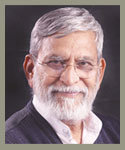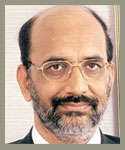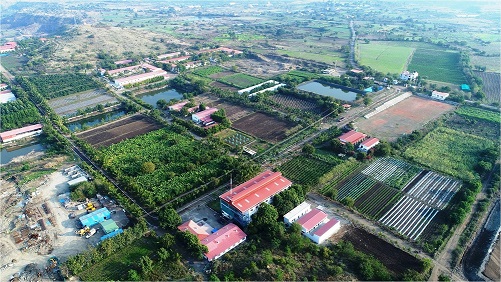About Us
The Mahatma Gandhi Mission Trust was established on 20th December, 1982 with a futuristic vision to provide qualitative education by applying innovative and dynamic pedagogical techniques. Since inception, the Trust has focused on providing health care services, school education and higher education with dedication and commitment. The MGM Trust was established in Nanded, (Maharashtra) and in the course of time it extended its services to Aurangabad, Navi Mumbai and Parbhani in Maharashtra and Noida (New Delhi) in UP. A chain of Schools, Engineering, Architecture, Medical, Nursing, Management, Computer Science & IT, Bioinformatics & Biotechnology, Fine Arts and Journalism stand testimony to the endeavors of the Trust. The MGM has been instrumental in promoting Classical Dance and Music for art seekers. The Trust has also paid heed to the aspect of physical fitness by converting a vast expanse of land in to a sports complex with multiple amenities and sports equipments. MGM's lush green and serene campuses are conducive to create a peaceful learning atmosphere.
Service to society at the grass root level has been the basic vocation of the Trust along with education. The Trust has been instrumental in providing prompt and efficient health care services to the economically weaker sections of the society. The Trust hospitals and Medical colleges underscore its commitment to human resource development and social health and welfare. The Trust has made phenomenal progress under the viable leadership of the founders led by Chairman, Hon. Shri. Kamal Kishore Kadam, Ex-Education Minister, Maharashtra Government. All the founder members are hard core academicians and visionaries inspired by Late Shri Nanasaheb Kadam, an ardent follower of the Gandhian ideology.
The recipient of International Environment Trophy, MGM continues its journey, imparting value based services, creating global technocrats and health care personnel
VISION
- To ensure sustainable human development which encourages self-reliant and self-content society.
- To promote activities related to community services, social welfare and also Indian heritage and culture.
- To inculcate the culture of non-violence and truthfulness through vipassanna meditation and Gandhian Gandhian Philosophy.
- To develop the culture of simple living and high thinking.
MISSION
- To impart state of art education and technical expertise to students and give necessary training to teachers to create self-reliant society for future.
- To encourage students to participate in Indian and International activities in sports, literature, etc. so that future generation becomes base for free and liberal society.
- To educate students in areas like Management, Finance, Human relations to inculcate philosophy of simple living and high thinking value of simple economic society.
- To inculcate culture of non-violence and truthfulness through Vipassana.
- To sustain activities of Indian culture (viz. classical dance, music and fine arts) through establishing institutes like Mahagami, Naturopathy, etc.
Journey:
For more than three decades, Mahatma Gandhi Mission (MGM) has blazed a trail of academic excellence and state-of-art health care services. A strong, dynamic institution that keeps pace with the demands of the modern world, prominent locations and excellent education facilities makes MGM worthwhile and an exciting choice for education.
This organization is devoted to work for high standards in specialized academic field with primary objective of post-graduate education, instruction and training in various branches of learning, research for the advancement of knowledge and building up sound character. Health care, social services and research activities are also our prominent features.
Team
 Kamalkishor N. Kadam Chairman
Kamalkishor N. Kadam Chairman
 Dr. P. M. Jadhav
Dr. P. M. Jadhav
 Ankushrao N. Kadam
Ankushrao N. Kadam
 Dr. Sudhir Kadam
Dr. Sudhir Kadam
 Mr. Vishwas Kadam Trustee
Mr. Vishwas Kadam Trustee
 Dr. Nitin Kadam
Dr. Nitin Kadam
About KVK
Krishi Vigyan Kendra (KVK), the farm science center is a district level organization of Indian Council of Agricultural Research (ICAR) set up with a mandate to transfer of advanced agricultural technologies to the farming community of the district. KVK bridges the gap between the technologies developed at the research institutions and its adoption at the field level by the farmers through various approaches to up-scale technologies to farmers.
Krishi Vigyan Kendra (MGM), the farm science centre for Aurangabad Dist, Maharashtra, India, was established by Indian council of agricultural research (ICAR) on 30th August, 2011 and fully functioning the KVK from February, 2013 onwards to ensure technology back stopping to farming community and extension mechanism of four tehsils viz., Gangapur, Vaijapur, Khultabad and Kannad, of Aurangabad District. Krishi Vigyan Kendra has been assigned to develop and disseminate location specific technological modules through technology assessment and demonstration and to act as knowledge and resource centre for agriculture and its allied activities with following mandates:
- Conducting on farm testing to identify the location specificity of agricultural technologies under various farming systems
- Organizing frontline demonstrations to establish production potential of various crops and enterprises on the farmer field
- Organizing need based training of farmers to update their knowledge and skills in modern agricultural technologies
- Creating awareness about improved technologies to larger masses through appropriate extension programmes
- Production and supply of good quality seeds and planting materials, livestock, poultry and fisheries breeds and products and various bio-products to the farming community.
- Work as resource and knowledge centre of agricultural technology for supporting initiatives of public, private and voluntary sectors for improving agricultural economy of the district.
District Agriculture Profile:
Sr.No.
Particular
Nos./Area (ha)
1
Geographical Area
10.07 Lakh ha
2
Area Under Cultivation
8.12 Lakh ha
3
Area Under kharif crops
5.84 Lakh ha
4
Area under Rabi crops
2.60 Lakh ha
5
Area under summer crops
0.03 Lakh ha
6
Irrigated Area
1.03 Lakh ha.
7
No of Irrigation projects (Big, Medium and Small)
245
1 Big, 19 Medium, 225 Small
8
No of Wells
60491
9
Area under well irrigation
0.74 Lakh Ha.
Soil type:
Sr. No.
Soil type
Characteristics
Area (%)
1
Shallow soils
Depth 22.5 cm particle size 0.02 mm Net drained soils low water holding capacity
46
2
Medium black soils
Depth 22.5 to 45 cm. Medium water holding capacity particle size 0.002 mm
19
3
Deep black soils
Depth 60-90 cm high swelling & shrinkage property poor drainage. High water holding capacity. Particle size 0.002 mm.
35
Cropping pattern:–
Season
Crops
Kharif
Cotton, Pigeon pea, Maize, Soybean
Rabi
Wheat, Bengal gram
Cash crop
Sugarcane, cotton, Ginger
Fruit crop
Sweet orange, Pomegranate, Mango
Agro-climatic Zones & major agro ecological situations (based on soil and topography) Gangapur, Vaijapur, Khultabad and Kannad
Sr. No.
Agro-climatic Zone
Characteristics
Tahasils covered
1.
Western Maharashtra dry zone
Rainfall ranges from 700-900mm. Soils are medium black calcareous.
Vaijapur, Gangapur & Paithan
2.
Central Maharashtra plateau zone
Low rainfall , medium to heavy soils non CADA area
Aurangabad, Kannad, Khultabad, Phulambri, Sillod & Soygaon

The Mahatma Gandhi Mission Trust was established on 20th December, 1982 with a futuristic vision to provide qualitative education by applying innovative and dynamic pedagogical techniques. Since inception, the Trust has focused on providing health care services, school education and higher education with dedication and commitment. The MGM Trust was established in Nanded, (Maharashtra) and in the course of time it extended its services to Aurangabad, Navi Mumbai and Parbhani in Maharashtra and Noida (New Delhi) in UP. A chain of Schools, Engineering, Architecture, Medical, Nursing, Management, Computer Science & IT, Bioinformatics & Biotechnology, Fine Arts and Journalism stand testimony to the endeavors of the Trust. The MGM has been instrumental in promoting Classical Dance and Music for art seekers. The Trust has also paid heed to the aspect of physical fitness by converting a vast expanse of land in to a sports complex with multiple amenities and sports equipments. MGM's lush green and serene campuses are conducive to create a peaceful learning atmosphere.
Service to society at the grass root level has been the basic vocation of the Trust along with education. The Trust has been instrumental in providing prompt and efficient health care services to the economically weaker sections of the society. The Trust hospitals and Medical colleges underscore its commitment to human resource development and social health and welfare. The Trust has made phenomenal progress under the viable leadership of the founders led by Chairman, Hon. Shri. Kamal Kishore Kadam, Ex-Education Minister, Maharashtra Government. All the founder members are hard core academicians and visionaries inspired by Late Shri Nanasaheb Kadam, an ardent follower of the Gandhian ideology.
The recipient of International Environment Trophy, MGM continues its journey, imparting value based services, creating global technocrats and health care personnel
VISION
- To ensure sustainable human development which encourages self-reliant and self-content society.
- To promote activities related to community services, social welfare and also Indian heritage and culture.
- To inculcate the culture of non-violence and truthfulness through vipassanna meditation and Gandhian Gandhian Philosophy.
- To develop the culture of simple living and high thinking.
MISSION
- To impart state of art education and technical expertise to students and give necessary training to teachers to create self-reliant society for future.
- To encourage students to participate in Indian and International activities in sports, literature, etc. so that future generation becomes base for free and liberal society.
- To educate students in areas like Management, Finance, Human relations to inculcate philosophy of simple living and high thinking value of simple economic society.
- To inculcate culture of non-violence and truthfulness through Vipassana.
- To sustain activities of Indian culture (viz. classical dance, music and fine arts) through establishing institutes like Mahagami, Naturopathy, etc.
Journey:
For more than three decades, Mahatma Gandhi Mission (MGM) has blazed a trail of academic excellence and state-of-art health care services. A strong, dynamic institution that keeps pace with the demands of the modern world, prominent locations and excellent education facilities makes MGM worthwhile and an exciting choice for education.
This organization is devoted to work for high standards in specialized academic field with primary objective of post-graduate education, instruction and training in various branches of learning, research for the advancement of knowledge and building up sound character. Health care, social services and research activities are also our prominent features.
Team

Kamalkishor N. Kadam Chairman
|

Dr. P. M. Jadhav
|

Ankushrao N. Kadam
|

Dr. Sudhir Kadam
|

Mr. Vishwas Kadam Trustee
|

Dr. Nitin Kadam
|
About KVK
Krishi Vigyan Kendra (KVK), the farm science center is a district level organization of Indian Council of Agricultural Research (ICAR) set up with a mandate to transfer of advanced agricultural technologies to the farming community of the district. KVK bridges the gap between the technologies developed at the research institutions and its adoption at the field level by the farmers through various approaches to up-scale technologies to farmers.
Krishi Vigyan Kendra (MGM), the farm science centre for Aurangabad Dist, Maharashtra, India, was established by Indian council of agricultural research (ICAR) on 30th August, 2011 and fully functioning the KVK from February, 2013 onwards to ensure technology back stopping to farming community and extension mechanism of four tehsils viz., Gangapur, Vaijapur, Khultabad and Kannad, of Aurangabad District. Krishi Vigyan Kendra has been assigned to develop and disseminate location specific technological modules through technology assessment and demonstration and to act as knowledge and resource centre for agriculture and its allied activities with following mandates:
- Conducting on farm testing to identify the location specificity of agricultural technologies under various farming systems
- Organizing frontline demonstrations to establish production potential of various crops and enterprises on the farmer field
- Organizing need based training of farmers to update their knowledge and skills in modern agricultural technologies
- Creating awareness about improved technologies to larger masses through appropriate extension programmes
- Production and supply of good quality seeds and planting materials, livestock, poultry and fisheries breeds and products and various bio-products to the farming community.
- Work as resource and knowledge centre of agricultural technology for supporting initiatives of public, private and voluntary sectors for improving agricultural economy of the district.
District Agriculture Profile:
|
Sr.No. |
Particular |
Nos./Area (ha) |
|
1 |
Geographical Area |
10.07 Lakh ha |
|
2 |
Area Under Cultivation |
8.12 Lakh ha |
|
3 |
Area Under kharif crops |
5.84 Lakh ha |
|
4 |
Area under Rabi crops |
2.60 Lakh ha |
|
5 |
Area under summer crops |
0.03 Lakh ha |
|
6 |
Irrigated Area |
1.03 Lakh ha. |
|
7 |
No of Irrigation projects (Big, Medium and Small) |
245 1 Big, 19 Medium, 225 Small |
|
8 |
No of Wells |
60491 |
|
9 |
Area under well irrigation |
0.74 Lakh Ha. |
Soil type:
|
Sr. No. |
Soil type |
Characteristics |
Area (%) |
|
1 |
Shallow soils |
Depth 22.5 cm particle size 0.02 mm Net drained soils low water holding capacity |
46 |
|
2 |
Medium black soils |
Depth 22.5 to 45 cm. Medium water holding capacity particle size 0.002 mm |
19 |
|
3 |
Deep black soils |
Depth 60-90 cm high swelling & shrinkage property poor drainage. High water holding capacity. Particle size 0.002 mm. |
35 |
Cropping pattern:–
|
Season |
Crops |
|
Kharif |
Cotton, Pigeon pea, Maize, Soybean |
|
Rabi |
Wheat, Bengal gram |
|
Cash crop |
Sugarcane, cotton, Ginger |
|
Fruit crop |
Sweet orange, Pomegranate, Mango |
Agro-climatic Zones & major agro ecological situations (based on soil and topography) Gangapur, Vaijapur, Khultabad and Kannad
|
Sr. No. |
Agro-climatic Zone |
Characteristics |
Tahasils covered |
|
1. |
Western Maharashtra dry zone |
Rainfall ranges from 700-900mm. Soils are medium black calcareous. |
Vaijapur, Gangapur & Paithan |
|
2. |
Central Maharashtra plateau zone |
Low rainfall , medium to heavy soils non CADA area |
Aurangabad, Kannad, Khultabad, Phulambri, Sillod & Soygaon |
